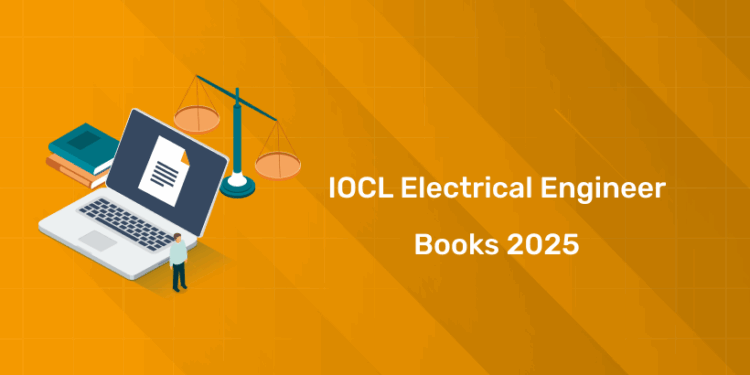Table of Contents
When preparing for the IOCL Electrical Engineer 2025 exam, using the right study materials is crucial. Books aligned with the syllabus help you study in depth, focus on important topics, and organize your preparation successfully. In this blog, we’ve compiled a list of recommended IOCL Electrical Engineering books 2025 for all topics to guide your focused and structured preparation.
IOCL Electrical Engineering 2025 Notification Highlights
| Feature | Details |
|---|---|
| Organization | Indian Oil Corporation Limited (IOCL) |
| Post | Engineers/Officers (Grade-A) – Electrical |
| Recruitment Mode | Computer Based Test (CBT) followed by GD, GT & PI |
| Eligibility | BE/B.Tech in Electrical or related specializations |
| Age Limit | General/EWS: ≤26 years; Relaxation as per Govt. norms |
| Application Start Date | 05.09.2025 |
| Application End Date | 21.09.2025 (till 17:00 hrs) |
| CBT Date | 31.10.2025 |
| Admit Card | 17.10.2025 |
| Application Fee | ₹500 + GST for General/OBC; SC/ST/PwBD – exempted |
| Salary | ₹50,000 – ₹1,60,000 per month + allowances |
| Selection Process | CBT → GD/GT → Personal Interview |
| Reservation | As per Govt. guidelines (OBC-NCL, SC, ST, EWS, PwBD) |
| Official Website | www.iocl.com |
Recommended IOCL Electrical Engineer Books 2025
sing subject-wise recommended books helps you study in depth, focus on key topics, and strengthen your understanding. Here, we have attached a detailed list of recommended books for IOCL Electrical, Chemical, and Instrumentation Engineering exams.
| Syllabus/Subject | Recommended Books | Author / Publisher |
|---|---|---|
| Chemical Engineering | Chemical Engineering: Fluid Flow, Heat & Mass Transfer, and Reaction Engineering | Coulson & Richardson’s Chemical Engineering Series |
| Chemical Engineering Thermodynamics | Smith, Van Ness & Abbott | |
| Chemical Process Industries Handbook | Shreve | |
| Introduction to Chemical Engineering | Walter L. Badger & Julius T. Banchero | |
| Plant Design and Economics for Chemical Engineers | Peters, Timmerhaus & West | |
| Electrical Engineering | Electrical Machines | P.K. Gupta / P.S. Bhimbra |
| Power Systems Engineering | V.K. Mehta & Rohit Mehta | |
| Control Systems Engineering | Nagrath & Gopal | |
| Electrical Circuit Analysis | Joseph Edminister / Hayt & Kemmerly | |
| Power Electronics | M. H. Rashid | |
| Signals & Systems | Alan V. Oppenheim | |
| Electrical Measurements | Golding & Widdis | |
| Instrumentation Engineering | Instrumentation for Process Measurement & Control | Patranabis |
| Industrial Instrumentation | D. Patranabis | |
| Sensors and Transducers | A.K. Sawhney | |
| Control Systems Engineering | Nagrath & Gopal | |
| Process Control: Principles and Applications | Joshi | |
| Verbal Ability / English | Objective English | R.S. Aggarwal |
| High School English Grammar & Composition | Wren & Martin | |
| Word Power Made Easy | Norman Lewis | |
| Quantitative Aptitude | Quantitative Aptitude for Competitive Exams | R.S. Aggarwal |
| Fast Track Objective Arithmetic | Rajesh Verma | |
| Quantitative Aptitude for All Competitive Exams | Abhijit Guha | |
| Logical Reasoning | A Modern Approach to Logical Reasoning | R.S. Aggarwal |
| Analytical Reasoning | M.K. Pandey | |
| Logical Reasoning & Data Interpretation | Arihant Publications |
How to Prepare with Books for IOCL Electrical Engineer 2025
- Start with Syllabus-Wise Reading: Follow the recommended books topic by topic as per the official syllabus to ensure complete coverage.
- Understand Concepts Deeply: Read theory carefully, make notes, and focus on understanding rather than rote learning.
- Solve Previous Year Questions (PYQs): This helps identify important topics and understand the exam pattern.
- Take Mock Tests: Apply knowledge in timed conditions to improve speed and accuracy.
- Regular Revision: Revisit key concepts, formulas, and diagrams frequently to retain information.
- Highlight Important Points: Use sticky notes or margin highlights for quick last-minute revision.
- Balance Theory and Practice: Allocate time for reading as well as solving numerical and conceptual problems.
- Track Progress: Maintain a checklist of topics covered and mark weak areas for extra practice.
- Stay Consistent: Follow a daily or weekly routine to gradually cover the entire syllabus before the exam.












